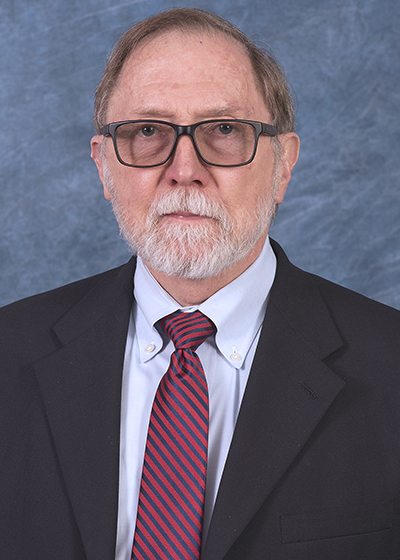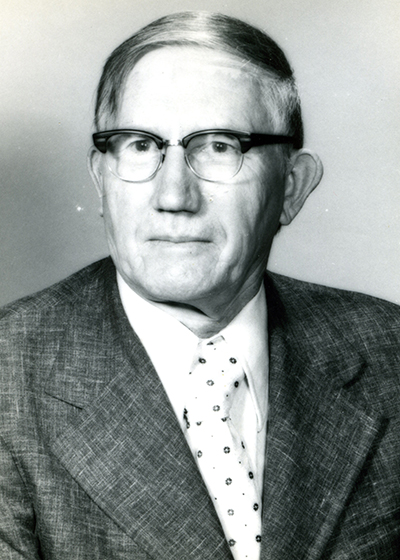Today@Sam Article
Administrator, Former Prof Named To CHSS Wall Of Honor
Feb. 17, 2017
SHSU Media Contact: Jennifer Gauntt
The Sam Houston State University College of Humanities and Social Sciences will recognize two individuals for their outstanding service and accomplishments during the 2017 Wall of Honor ceremony on Friday (Feb. 24).
CHSS associate dean and professor of psychology Amos Jerry Bruce and the late Rupert C. Koeninger will be honored at 4 p.m. in CHSS Building Room C070, followed by a reception in the CHSS Building's first floor lobby. The ceremony is open to the public.
Since joining the SHSU Department of Psychology in 1970, Jerry Bruce has demonstrated his leadership in the department, in the College of Humanities and Social Sciences and in the College of Education.
 |
| Amos Jerry Bruce |
Currently serving as CHSS associate dean and professor of psychology, Bruce works with the college’s probationary undergraduate students, chairs its curriculum committee, is a driving force for its undergraduate research, and serves on the university curriculum committee.
For more than 25 years he chaired the Department of Psychology and Philosophy, and under his helm, the department established a master’s program, as well as the clinical psychology doctorate, which is accredited by the American Psychological Association and is highly ranked. Bruce also fostered the department’s Bachelor of Science degree in emerging as one of the largest and most respected majors on campus.
His efforts didn’t go unnoticed, and in 2013, Bruce was tapped to serve as interim dean of the College of Education for a year following the retirement of Dean Genevieve Brown.
Throughout his years of leadership, Bruce also has been noted for his dedication to his students, being cited for his reputation of putting students’ success above all.
Still teaching half-time, he has taken up the cause of making textbooks more affordable for students, experimenting with writing his own textbook and making it available on the Blackboard platform at no cost.
“He labors to make his lectures up-to-date, interesting, and relevant to students of psychology,” a nominator said. “He struggles with providing a learning environment that is both stimulating and comfortable for students as they process the history of psychology information through critical thinking assignments.”
Outside of the classroom, he has written or co-written articles on psychological attachment, police officers’ ability to cope with trauma, religion and pedagogy assessment, among other topics. He also is active in the Huntsville community, having taught the same Sunday school class for more than 40 years at First United Methodist Church. In honor of his dedication and service, the class established an SHSU scholarship in his name.
Bruce earned his Bachelor of Arts degree in religious studies from Anderson University in Indiana and his master’s and doctoral degrees in psychology from the University of Georgia.
He and wife Betty have two sons and four grandchildren. Having moved nearly as often as the 53 years they have been married, Bruce aspires to one day write an autobiography entitled “Living with Betty: A moving experience.”
Known for his contributions to the fights for academic freedom and civil rights in Texas, Rupert C. Koeninger began his career at Sam Houston Teachers College in 1947.
 |
| Rupert C. Koeninger |
As professor and chair in the Department of Sociology, Koeninger developed a reputation for his hands-on applied sociology, teaching students about issues of equality while also having a major impact on educational and criminal justice issues in Texas.
Under his leadership, the sociology department expanded from one to five faculty members, earning a national reputation for excellence on the bachelor's and master's levels. He also taught summers in the Sam Houston Mexican Field School, taking students to major urban areas, through small towns and to major attractions.
Between 1948-1954, he concurrently held a position as the first director of the Texas Prison System’s Bureau of Classification and collaborated on the Minnesota Multiphasic Personality Inventory by testing prisoners and students, while also teaching advanced sociology courses within the prison. A number of his articles spearheaded prison reform programs and led to great improvements within the Texas Department of Criminal Justice.
Koeninger’s work also had an impact on the nation.
His essays on “Capital Punishment in Texas, 1924-68” and “Rape, Race, and Death in the State of Texas” shaped the U.S. Supreme Court’s landmark Furman v. Georgia decision, which forced state legislatures to revise and clarify statutes on the death penalty in an effort to prevent discrimination. Justices William O. Douglas and Thurgood Marshall claimed the study on rape, race and death as the prime empirical evidence for voting against the death penalty.
Koeninger was dismissed from SHSTC in 1962 because of his activism in helping African-Americans register to vote in Walker County and for denouncing the lack of implementation of the Brown v. Board of Education decision. A direct result of Koeninger's resulting appeal was that the Texas Legislature formed the Higher Education Coordinating Board, which took action to protect the academic freedom and tenure of university faculty in the Lone Star State.
Koeninger earned his Bachelor of Arts degree from Texas Technological College in 1929, his Master of Arts degree in sociology from the University of Chicago in 1936, and his doctorate in sociology from Ohio State University in 1939.
He and wife Ethel had four children—Fiamma di Gioia, Cliff, Frieda and Art—and 11 grandchildren. He died at the age of 84 in 1991
- END -
This page maintained by SHSU's Communications Office:
Director of Content Communications: Emily Binetti
Communications Manager: Mikah Boyd
Telephone: 936.294.1837
Communications Specialist: Campbell Atkins
Telephone: 936.294.2638
Please send comments, corrections, news tips to Today@Sam.edu
